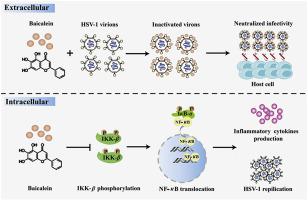Acta Pharmaceutica Sinica B ( IF 14.7 ) Pub Date : 2020-06-25 , DOI: 10.1016/j.apsb.2020.06.008 Zhuo Luo , Xiu-Ping Kuang , Qing-Qing Zhou , Chang-Yu Yan , Wen Li , Hai-Biao Gong , Hiroshi Kurihara , Wei-Xi Li , Yi-Fang Li , Rong-Rong He

|
Herpes simplex virus type 1 (HSV-1) is a ubiquitous and widespread human pathogen, which gives rise to a range of diseases, including cold sores, corneal blindness, and encephalitis. Currently, the use of nucleoside analogs, such as acyclovir and penciclovir, in treating HSV-1 infection often presents limitation due to their side effects and low efficacy for drug-resistance strains. Therefore, new anti-herpetic drugs and strategies should be urgently developed. Here, we reported that baicalein, a naturally derived compound widely used in Asian countries, strongly inhibited HSV-1 replication in several models. Baicalein was effective against the replication of both HSV-1/F and HSV-1/Blue (an acyclovir-resistant strain) in vitro. In the ocular inoculation mice model, baicalein markedly reduced in vivo HSV-1/F replication, receded inflammatory storm and attenuated histological changes in the cornea. Consistently, baicalein was found to reduce the mortality of mice, viral loads both in nose and trigeminal ganglia in HSV-1 intranasal infection model. Moreover, an ex vivo HSV-1-EGFP infection model established in isolated murine epidermal sheets confirmed that baicalein suppressed HSV-1 replication. Further investigations unraveled that dual mechanisms, inactivating viral particles and inhibiting IκB kinase beta (IKK-β) phosphorylation, were involved in the anti-HSV-1 effect of baicalein. Collectively, our findings identified baicalein as a promising therapy candidate against the infection of HSV-1, especially acyclovir-resistant strain.
中文翻译:

黄ical素对1型单纯疱疹病毒的抑制作用
1型单纯疱疹病毒(HSV-1)是一种普遍存在的人类病原体,会引起一系列疾病,包括唇疱疹,角膜盲和脑炎。目前,由于诸如阿昔洛韦和喷昔洛韦之类的核苷类似物在治疗HSV-1感染中的应用,由于其副作用和对耐药菌株的低效作用,常常受到限制。因此,应紧急开发新的抗疱疹药物和策略。在这里,我们报道了黄ical素(一种在亚洲国家广泛使用的天然来源的化合物)在几种模型中强烈抑制了HSV-1复制。黄ical素在体外对HSV-1 / F和HSV-1 / Blue(抗阿昔洛韦的菌株)的复制均有效。在眼接种小鼠模型中,黄ical素明显减少体内HSV-1 / F复制,消退的炎性风暴和减弱的角膜组织学变化。一致地,在HSV-1鼻内感染模型中,发现黄ical素可降低小鼠的死亡率,降低鼻子和三叉神经节的病毒载量。此外,在分离的鼠表皮片中建立的离体HSV-1-EGFP感染模型证实黄ical素能抑制HSV-1复制。进一步的研究揭示了双重机制,即灭活病毒颗粒和抑制IκB激酶β(IKK- β)磷酸化,参与了黄ical素的抗HSV-1效应。总的来说,我们的发现确定黄ical素是抗HSV-1感染,特别是抗阿昔洛韦菌株的有前途的候选疗法。











































 京公网安备 11010802027423号
京公网安备 11010802027423号